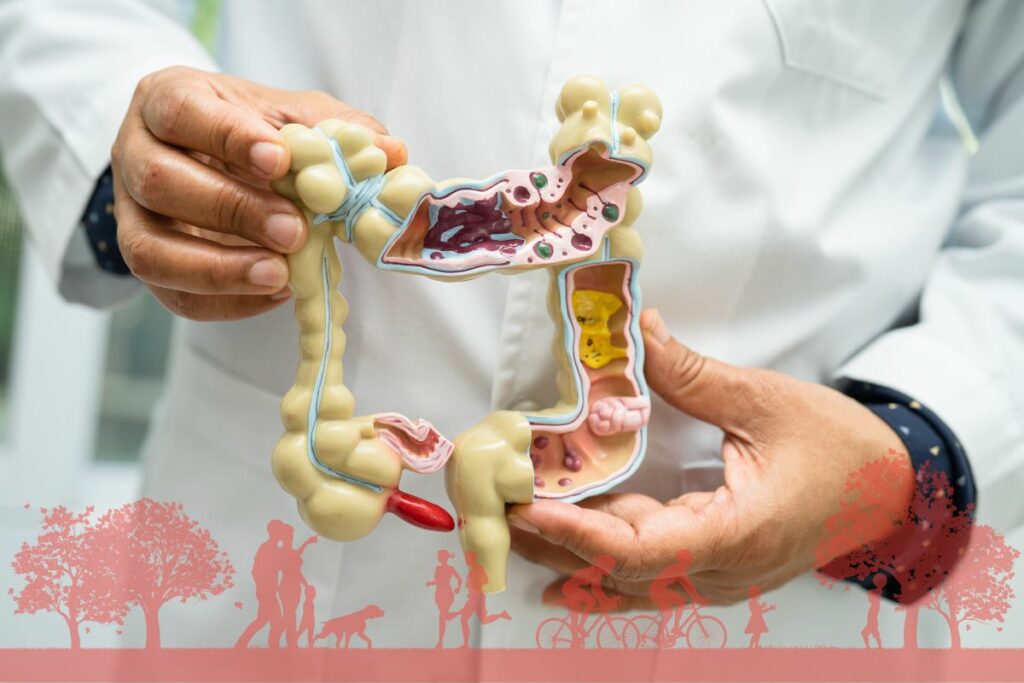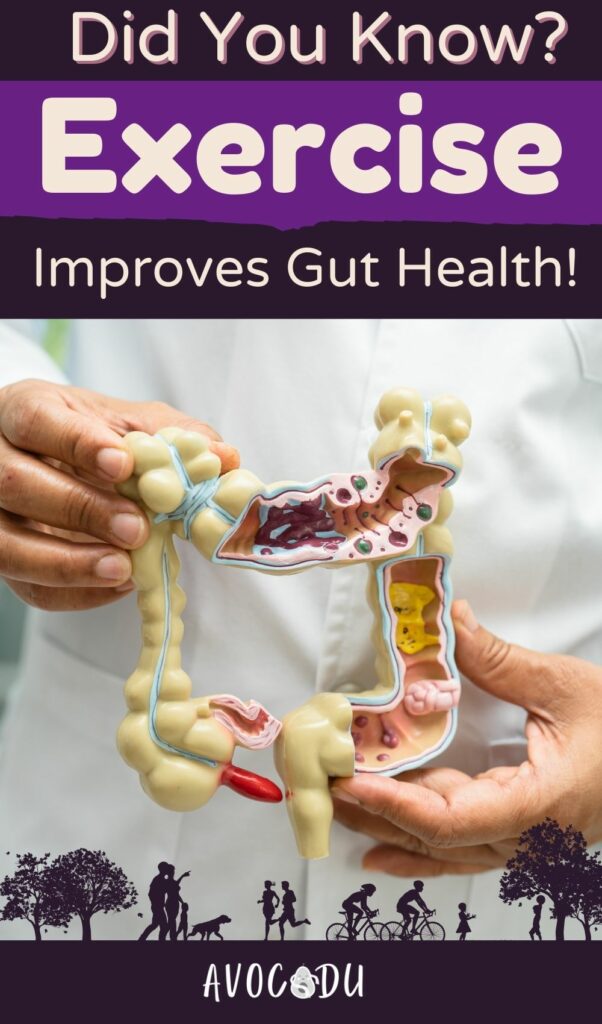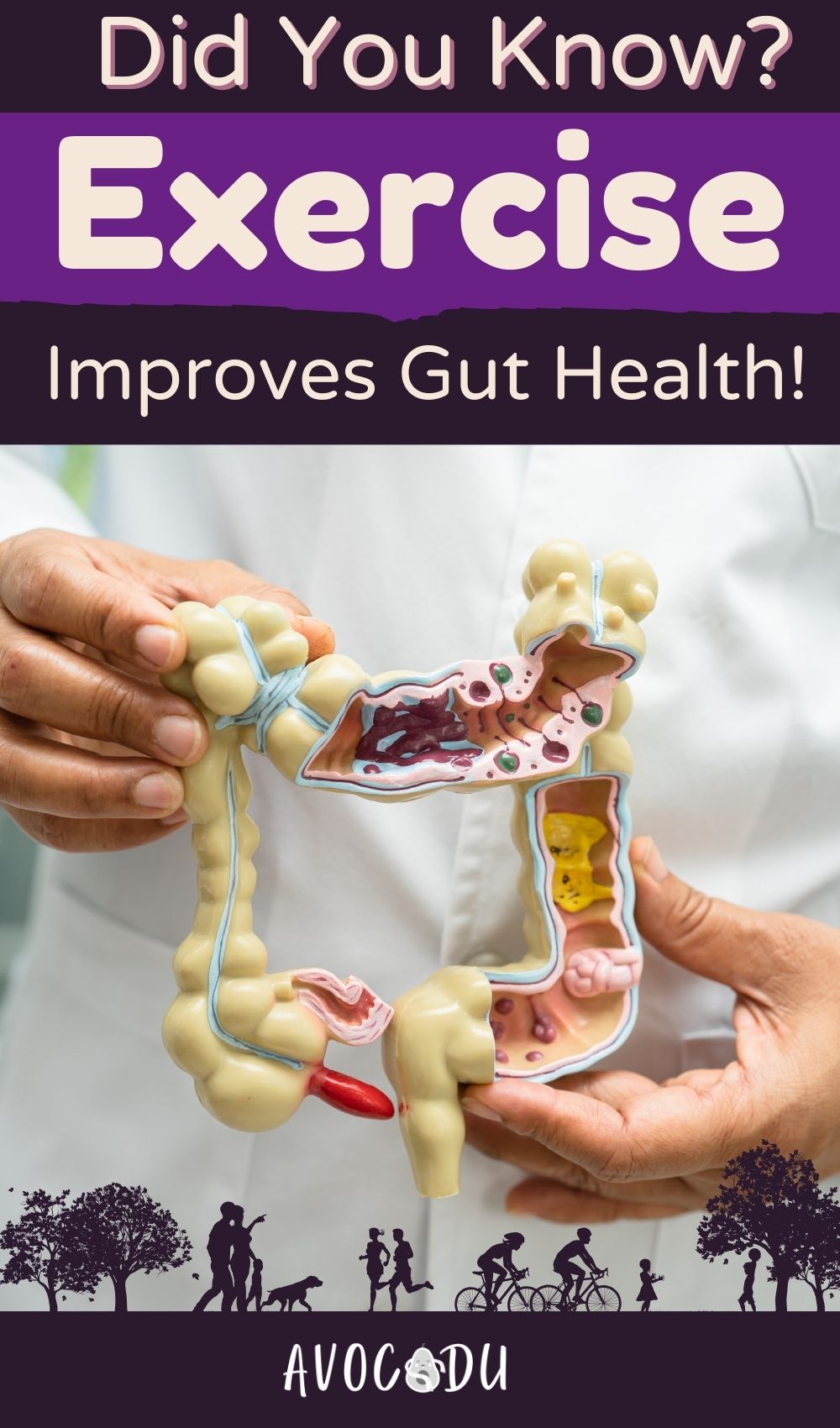When you think about the benefits of exercise, your mind probably jumps to toned muscles, better cardiovascular health, or even weight loss.
These are the perks we often focus on, but there’s a whole other side of the story you might not have considered. Your gut health!
What you may not realize is that regular movement doesn’t just strengthen your body; it also works wonders for your digestive system.
From improving digestion to supporting the balance of gut bacteria, exercise plays a significant role in how well your gut functions.
In fact, the millions of microbes in your digestive tract rely on your physical activity to stay in balance and keep things running smoothly.
Let’s break down how your workouts could be doing more than you realize for your digestive health.

This post may contain affiliate links, which helps keep this content free. Please read our disclosure for more info.
The Gut Microbiome: Why It Matters
First, let’s quickly cover why your gut is such a big deal. Inside your digestive system, there’s a bustling community of bacteria, fungi, viruses, and other microorganisms.
Together, these tiny organisms form what’s called the gut microbiome—a complex ecosystem that affects nearly every aspect of your health.
While they may be small, these microbes play massive roles in your body. They help you break down food, absorb nutrients, and even produce essential vitamins like B12 and K.
Beyond digestion, they also protect your body from harmful invaders by supporting your immune system.
But the gut’s influence doesn’t stop at digestion and immunity. Researchers have discovered that your gut is closely tied to your brain through something called the gut-brain axis.
This connection means the health of your gut can affect your mood, stress levels, and mental clarity. Ever had “butterflies” when you were nervous or felt queasy when stressed? That’s your gut and brain talking to each other.
The key to a healthy gut lies in keeping a balanced mix of good and bad bacteria. When the good bacteria thrive, they help regulate inflammation, promote efficient digestion, and keep harmful bacteria in check.
But when things fall out of balance, whether due to poor diet, stress, or lack of exercise, you can experience digestive issues, weakened immunity, and even mental health challenges like anxiety or depression.
Keeping your gut microbiome healthy is just as important as getting your steps in or hitting the gym, and it needs just as much attention as the rest of your body if you want to feel your best from the inside out.
Check out Avocadu’s Gut-13 Probiotic Supplement here!
Exercise and Its Impact on the Gut

The connection between exercise and gut health might not be obvious, but researchers are discovering that how you move can make a big impact on what’s happening inside your digestive system.
Exercise not only helps you build strength and endurance, but it also promotes a healthier gut environment.
From improving microbial diversity to reducing inflammation, different types of exercise influence your gut in different ways. So, let’s look at how various forms of physical activity contribute to a healthier gut.
Cardio and Gut Health
If you’re into activities like walking, running, or cycling, you’re already doing your gut a favor. Studies show that moderate aerobic exercise, like a steady jog, brisk walking, or biking, can increase the diversity of bacteria in your gut.
This diversity is important because a more varied gut microbiome is linked to stronger immune function, better digestion, and improved overall health. More diversity in your gut bacteria also makes it easier for your body to break down and absorb different nutrients.
Strength Training and Gut Health
If lifting weights is more your style, you’ll be happy to know that resistance training has some serious benefits for your gut as well.
Strength training has been shown to reduce inflammation throughout the body, and this includes your gut.
By lowering inflammation, you’re helping protect the lining of your gut, which plays a crucial role in how well your body absorbs nutrients and keeps harmful substances out.
Strong muscles also mean better overall body function, which indirectly supports gut health.
When you build muscle, your body becomes more efficient at handling glucose and insulin, both of which impact your gut and metabolism.
High-Intensity Workouts and the Gut
If you’re a fan of high-intensity interval training (HIIT), you might be curious about how those fast-paced, intense workouts affect your gut.
HIIT workouts, known for their short bursts of high-energy exercises followed by brief recovery periods, have been shown to increase beneficial bacteria in the gut.
This boost in good bacteria can lead to better gut health, more efficient digestion, and reduced inflammation.
However, there’s a catch. While HIIT can offer great benefits, pushing yourself too hard without proper recovery might cause issues for some people. Intense workouts, especially without adequate rest, can lead to increased gut permeability, sometimes known as “leaky gut”, which can cause discomfort and digestive problems.
That’s why it’s essential to listen to your body, incorporate recovery days, and not overdo it with high-intensity sessions. Balance is key when it comes to combining gut health and HIIT.
By understanding how different types of exercise affect your gut, you can make more informed decisions about how to stay active while keeping your digestive health in mind.
How Exercise Improves Gut Motility

What is gut motility? It’s essentially the process that keeps food moving through your digestive tract. It starts when you eat and continues until waste is eliminated.
Smooth and efficient gut motility is key for proper digestion, as it helps your body break down food, absorb nutrients, and get rid of what it doesn’t need.
When gut motility slows down, it can lead to uncomfortable issues like bloating, gas, or constipation. That’s where exercise comes in.
Regular physical activity plays a direct role in speeding up the movement of food through your digestive system.
It stimulates the muscles in your intestines to contract more frequently and efficiently, which helps keep things moving.
This is especially important if you’re prone to constipation, as getting enough movement throughout the day can help prevent food from sitting too long in your intestines.
Certain types of exercise can be particularly beneficial for gut motility.
For example, gentle activities like yoga or walking can stimulate your digestive tract without putting too much strain on your body. Yoga, in particular, involves poses that twist and stretch your abdominal area, which can help relieve bloating and stimulate bowel movements.
On the other hand, more vigorous activities like running or a dance class also promote healthy gut motility by keeping your entire body active and engaged.
But it’s not just structured workouts that make a difference. Even small lifestyle changes, like standing up and walking around after meals, can improve digestion.
Simple acts like taking the stairs, stretching during breaks, or even doing household chores can boost gut motility and reduce the chances of digestive discomfort.
The bottom line? Movement is essential for keeping your digestive system on track.
Exercise as a Tool for Reducing Gut Inflammation

Inflammation in the gut can cause a wide range of issues, from everyday discomfort like bloating and indigestion to more serious health concerns such as irritable bowel syndrome (IBS) and leaky gut syndrome.
Chronic inflammation in the gut can damage the lining of your intestines, making it harder for your body to absorb nutrients properly and allowing harmful substances, like toxins or bacteria, to enter your bloodstream. This can trigger a variety of health problems, not just in your gut but throughout your body.
The good news? Regular exercise is a powerful tool for reducing inflammation, both in your gut and in your entire body.
When you exercise, your body releases anti-inflammatory molecules that help combat the chronic inflammation that can lead to digestive problems.
This reduction in inflammation supports a healthier gut lining, which is essential for keeping harmful bacteria and toxins at bay.
In other words, exercise helps maintain the integrity of your gut barrier, which acts like a filter that lets the good stuff in and keeps the bad stuff out.
In particular, moderate, consistent exercise has been shown to have the most significant anti-inflammatory effects.
Activities like walking, swimming, or cycling can reduce inflammation without causing the added stress that might come from overdoing high-intensity workouts.
When your body is under less stress, your immune system can focus on keeping inflammation in check, including in the gut.
What’s more, reducing inflammation through exercise can also lower your risk for conditions like inflammatory bowel disease (IBD) and other gut-related disorders.
By helping regulate your immune response, regular movement may even prevent flare-ups for those already dealing with inflammatory gut issues.
Stress, Exercise, and Gut Health

Stress doesn’t just affect your mind, it has a big impact on your gut too. When you’re stressed, your body releases hormones like cortisol, which can disrupt digestion and trigger gut issues like bloating, indigestion, and even IBS.
Chronic stress also affects the balance of bacteria in your gut, which can lead to more serious digestive problems.
Exercise is one of the best ways to manage stress and, in turn, improve gut health.
When you move, your body releases endorphins, which help reduce stress and anxiety. This lowers cortisol levels, allowing your digestive system to function more smoothly.
Different exercises, from aerobic activities like running to calming practices like yoga, can help regulate stress and support gut motility.
Just be mindful not to overdo it—excessive exercise can actually increase stress, which could have the opposite effect on your gut. Finding the right balance will help you reduce stress and keep your gut happy and healthy.
Balancing Exercise with Gut Health: Tips for Success
To get the most gut health benefits out of your workouts, it’s important to approach exercise the right way. Here are a few tips to keep things balanced:
- Start Slow: If you’re new to exercising or getting back into it, ease into it. Over-exercising can cause stress on your body and gut, so it’s important to find a balance that works for you.
- Stay Hydrated: Drinking enough water is key for both exercise and digestion. Make sure to hydrate before, during, and after your workouts to help your body, and gut, function well.
- Combine with a Gut-Friendly Diet: Eating probiotic-rich foods like yogurt, kimchi, and sauerkraut can boost the effects of exercise on your gut. Also, make sure to include plenty of fiber in your diet to keep things moving smoothly.
- Rest and Recovery: Exercise is important, but so is rest. Your gut health improves when you get enough sleep and recovery time between workouts. Aim for a good night’s sleep and avoid pushing yourself too hard every day.
Boost Your Gut Health and Reduce Inflammation with the 21-Day Fat Loss Challenge
Exercise is more than just a way to stay in shape; it’s a key player in supporting your gut health and overall well-being.
Whether you’re into cardio, lifting weights, or just staying active with daily walks, your gut benefits from movement.
Pair your workouts with a gut-friendly diet, and you’ve got a winning combination for better digestion, reduced inflammation, and overall health.
If you’re ready to take things to the next level, consider the 21-Day Fat Loss Challenge from Avocadu.

This program isn’t just about losing weight; it emphasizes a healthy diet that supports gut health, reduces inflammation, and promotes better digestion.
By focusing on whole, nutrient-dense foods, you’ll be giving your body the fuel it needs to thrive, while also benefiting your gut and reducing unwanted inflammation.
Ready to revamp your diet, improve your gut health, and feel better all around? Learn more about the challenge here and discover how it can help you achieve your health goals!




